Dentures Torrance
A New Smile Is Possible with Reliable Prosthetics

Dentures are a natural-looking option for replacing several or a whole row of missing teeth. They are prosthetics that can restore your ability to eat, speak, and smile with confidence following tooth loss. Dr. Hamzehpour and our esteemed periodontist and prosthodontist provide beautiful, strong, and custom-made full and partial dentures in Torrance, CA. If you’re interested in learning more, don’t hesitate to contact our office for additional information or to schedule an appointment.
Why Choose Blue Coast Dental Group for Dentures?
- Tried-and-True Tooth Replacement
- Expert Prosthodontist & Periodontist on Staff
- Your Dental Insurance Benefits Will Be Maximized
When Dentures Are Needed
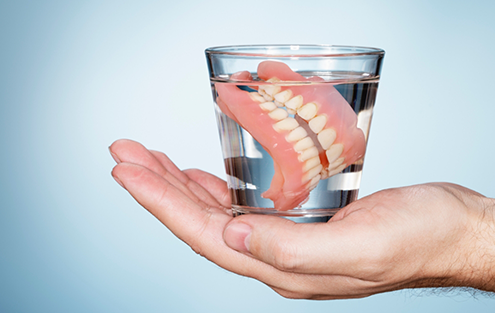
A denture is a crucial next step following the loss of multiple teeth. When you are missing just a few, their replacement may not seem all that urgent -- but your smile needs all of your teeth to function properly. Even just one missing tooth can cause real problems, allowing the remaining ones to drift out of place or increasing the risk of cavities and gum disease. The painful jaw condition known as TMD (temporomandibular joint dysfunction) is also associated with untreated tooth loss. In short, do not put off seeking a replacement with dentures!
Who’s a Good Candidate for Dentures?
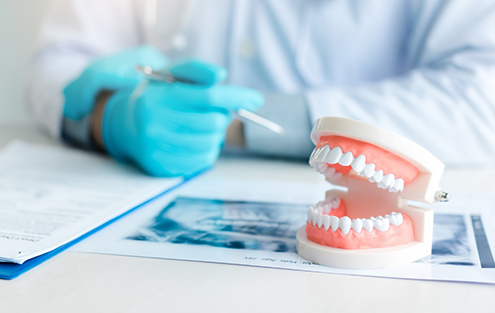
Most people with missing teeth can qualify for dentures, whether you lack one tooth or many. After all, the prosthetics are versatile and custom-designed to fill vacant smile gaps. Still, consulting with our dentists is the only way to confirm your candidacy. They’ll perform an in-person assessment to see if dentures suit you. In case they are not a good option, though, don’t worry – our office can help restore the health of your jaw and gums.
Effects of Missing Teeth
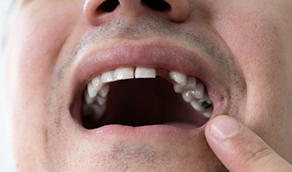
Before you fully settle on dentures, it’s helpful to review the cause and effect of tooth loss. Doing so lets you understand how prosthetic teeth can protect your health.
Ultimately, people lose teeth for various reasons. Someone might, for example, have severe decay, causing a tooth to fall out or need extraction. Meanwhile, another person might have gum disease – a condition that wears down the bone and tissue securing your pearly whites. It’s even possible for your teeth to be knocked out due to an accident or physical injury.
All that said, going without teeth is consistently harsh. For starters, tasks like eating, speaking, and smiling will become challenging. Untreated smile gaps will also erode your jawbone, which can lead to facial collapse. Those same spaces may even trigger more tooth loss.
What Qualifies You for Dentures?
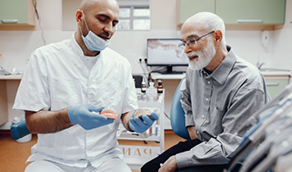
As mentioned before, most patients can qualify for dentures without teeth. Even so, there are other relevant factors to consider.
Take oral health, for instance. Dentures don’t only replace missing teeth; they’re also ideal substitutes for those that are sensitive or decaying. Furthermore, the prosthetics only work if your gum and jaw tissues are healthy enough. Good denture candidates, then, must stay committed to dental care.
The number of missing or replaced teeth is also essential. You’ll need one of two possible denture types based on the amount. A partial model is ideal for replacing a few teeth. In contrast, a full denture is only useful when all pearly whites along an arch are gone.
Of course, finances are crucial to candidacy as well. Dentures, you see, are cheaper than other restorations. As such, they’re ideal for patients on a budget.
Alternative Tooth Replacement Options
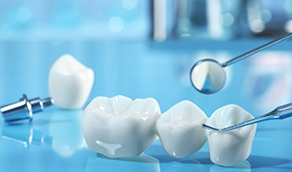
Even if you aren’t a good candidate for dentures, never fear. We at Blue Coast Dental Group have other options. More specifically, our office has two other restorative procedures we can offer. These include:
- Dental Bridges – As fixed restorations, dental bridges are made of crowns fused to one or more pontics. They rely on nearby healthy teeth to support themselves.
- Dental Implants – Unique among restorations, dental implants are prosthetics placed in your jawbone. As a result, they fuse with your mouth over time. This fusion means implants are secure and permanent, but it also makes treatment expensive.
Learn More About Dental Bridges
Learn More About Dental Implants
Benefits of Dentures

Dentures are one of the most life-changing dental treatments we offer here at Blue Coast Dental Group. Dr. Cho, our in-house prosthodontist, is an expert at creating hand-crafted prosthetics to not only look natural but also function as close to real teeth as possible. If you’re on the fence about getting dentures in Torrance, our team invites you to learn more about how this process can transform your confidence, life, and health.
Psychological Benefits

An incomplete smile can gradually wear on your psychological health, increasing your chances of experiencing depression, social anxiety, and frustration. Dentures not only rebuild the appearance of your grin but also its function, allowing you to smile and speak with pride.
Clearer Enunciation

Having several gaps in your arch or an entire row of missing teeth can cause you to develop speech impediments like lisps. For some, this can be an embarrassing reminder and highlight the fact that you’re missing teeth. With a complete smile, your tongue won’t get caught in the gaps of your arch, allowing you to pronounce certain words and sounds with ease.
Improved Nutrition

Missing teeth can severely limit your diet by making it difficult to chew certain foods, like meats, fresh, crunchy vegetables, and more. Not only can this be dissatisfying, especially if those are some of your favorite items to eat, but it can also make it difficult for your body to get the vitamins and minerals it needs to stay functional and healthy.
Preservation of Oral Health

Spaces within your mouth can become collection zones for food debris and plaque, increasing your chances of developing oral health problems like cavities, gum disease, and even further tooth loss. With routine maintenance of your dentures, like cleaning them daily, as well as regularly caring for your gums, you can preserve your oral health and prevent additional issues from arising.
Expanded Opportunities

One of the biggest challenges faced by those with missing teeth is how it impacts their confidence, which can trickle over into their careers and personal lives. With a complete and healthy smile, you can increase your performance during job interviews, helping you land a career-defining position by making a great first impression.
Your Denture Options
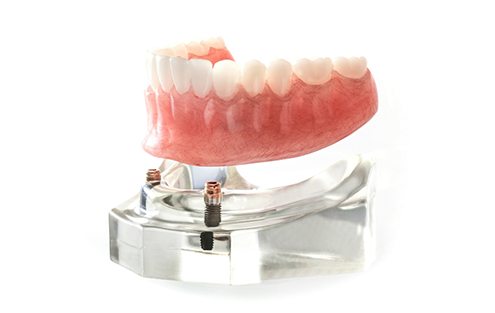
Considered a versatile treatment option for individuals missing teeth, dentures are a tried-and-true solution that can give you a more complete, functional appearance. Whether you choose full, partial, or implant dentures, our team will help you determine which one is right for you.
Full Dentures
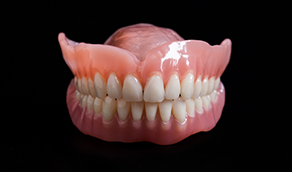
Full or complete dentures replace a full row of missing teeth in the top or bottom jaw. Typically made from an acrylic, gum-colored base and porcelain teeth, full dentures take on a natural appearance, making it less noticeable to others when wearing one. When not held in place by dental implants, a full denture is secured by your natural suction or with the help of a denture adhesive. Full dentures are removable for easy cleaning.
Partial Dentures
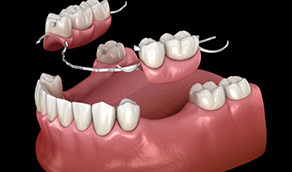
A partial denture fills the gaps in a smile when one or more natural teeth are still present in the gumline. When not supported by dental implants, a partial denture is also called a fixed bridge. This method uses the two teeth surrounding the gap as anchors. A dental crown is placed on each natural tooth, and the prosthetic teeth fill in the space between. A fixed bridge cannot be removed. It restores the smile’s function and prevents the surrounding teeth from drifting out of place.
Implant Dentures
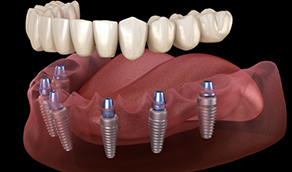
Patients who are eligible for dental implants should strongly consider an implant denture. Dental implants provide unmatched stability for your tooth replacement, promoting better oral health, and restoring your ability to eat, speak, and smile with full confidence.
Dental implants enjoy a success rate of more than 95% for eligible patients, but not everyone is a good candidate for the procedure. Successful dental implant surgery and recovery requires a strong, sturdy jawbone. Bone augmentation procedures may be necessary to strengthen the jaw before implantation. A patient should also be in good oral and overall health before getting dental implants. Diseases that affect the immune system, like diabetes, HIV/AIDS, and advanced-stage cancers also affect the eligibility for dental implants.
How Dentures Are Made
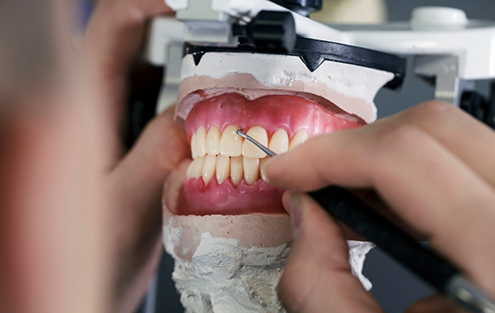
At Blue Coast Dental Group, our in-house prosthodontist fabricates master-crafted dentures using the highest quality dental materials, so you can enjoy prosthetics that look and feel natural. Whether you opt for traditional or implant dentures, you’ll receive replacement teeth that are designed to withstand daily use and serve you for years to come.
What Are Dentures Made Of?
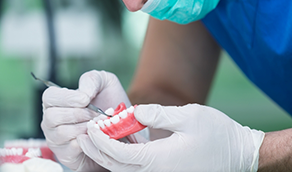
Our team uses the best materials to create both the base and teeth of your dentures. Here’s what each component of your prosthetic is built from:
- Denture Base: The base of dentures is what sits over your gumline and secures your replacement teeth within your mouth. If you’re receiving implant dentures, it’s what attaches to the abutments atop your implants. This can be made from different materials, each of which is designed to resemble your natural gum tissue, including nylon, acrylic, and resin. For traditional dentures, the base is specially sculpted to utilize natural suction to stay in place while you eat and speak.
- Replacement Teeth: The replacement teeth, just like your natural ones, are attached to the base of your dentures that resembles your gumline. These are made from natural-looking materials that can mimic the appearance of your tooth enamel by reflecting light, like resin and porcelain. They can also be custom-shaded to match the color of any existing teeth in your mouth to seamlessly blend in with your smile.
The Denture Creation Process
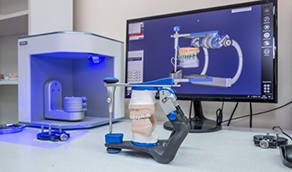
Each denture Dr. Cho crafts is designed based on your unique needs. First, he’ll take impressions of your gumline to help make a plaster model that resembles your mouth. This is used to ensure the prosthetic is an ideal fit for the unique contours of your gumline.
He will then create a replica of your dentures using wax which will be placed in what’s called an articulator, which is a device that can mimic the opening and closing of a jaw. From here, technicians can adjust the fit to seamlessly blend with your gumline and function properly. Our team will then pour plaster into the wax mold to create the shape of your dentures, melting the wax away with hot water.
Finally, acrylic, nylon, or resin will be injected into the mold to replace the wax. Before you can try on your dentures, we’ll use special lab tools to remove any remaining plaster and excess acrylic and polish them, so they have a brilliant and lifelike appearance.
Adjusting to Your New Dentures

Most patients go through an adjustment period with their dentures that lasts from two to four weeks. During this time, you may notice sores and discomfort as you wear them, as well as difficulty speaking and eating. However, once your facial muscles grow to support your prosthetic, you’ll be able to use them effortlessly.
Cost of Dentures

Because no two patients or smiles are the same, it will require a variety of factors to determine how much you can expect to spend on your new smile. Some of these include:
- The type of denture you will be required to wear (i.e., full, partial, or implant). If you want to avoid surgery, traditional dentures are often more affordable than those secured by implants.
- The materials used to create your custom-made denture. Many are created using an acrylic base and porcelain teeth, but it’s important that you discuss the options with your dentist, as some materials are more costly and durable than others.
- How much your dental insurance provider is willing to cover. Most plans do incorporate some form of coverage for dentures; however, if you prefer implant dentures, you may need to inquire about additional payment methods in case your insurer does not cover implants.
No matter the cost of your treatment, our team at Blue Coast Dental Group will help you navigate your financial obligations. Apart from the insurance providers we are in-network with, we also work closely with CareCredit financing to provide patients with a way to break up the cost of treatment into more manageable monthly payments.
What Are the Stages of Receiving Dentures?
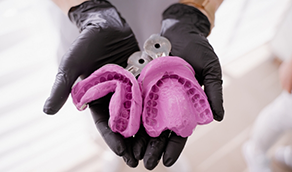
When it comes to receiving your finalized denture, you’ll need to remember that it takes time to ensure it is made correctly and comfortably. From the initial consultation with a member of our dental team to the impressions taken of your smile to the fabrication and final adjustments needed to make your restoration look and feel natural, each stage incurs a separate fee. Fortunately, our team is here to help you plan the cost of your treatment every step of the way.
If you are planning to move forward with implant dentures, the process requires additional time because of the potential pre-implant dental work you might need. If you require a bone graft, tooth extraction, or periodontal therapy, you can expect these procedures to incur additional time and money toward the overall cost of treatment.
Are Dentures Worth the Investment?
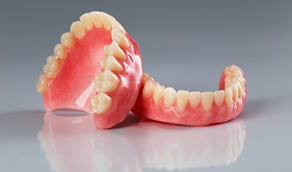
Without a doubt, dentures are well worth the investment. Dentures offer patients like yourself a chance to embrace a more vibrant and functional smile. No matter if you need a full denture, partial, or implant denture, you can expect to enjoy a better quality of life with your new restoration. Apart from your improved aesthetics and boosted confidence, you’ll be able to perform some of the most basic tasks each day (i.e., eating, chewing, speaking) and no longer worry about missing out on your favorite foods or family gatherings.
Does My Dental Insurance Cover Dentures?
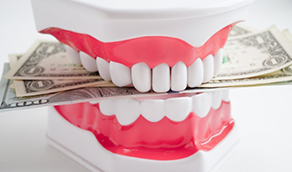
Most dental insurance companies offer coverage for prosthetics like dentures. Often viewed as a major restorative service, they may pay up to 50% of the total cost of treatment, but this is largely determined by whether you’ve met your deductible and how much of your annual maximum remains.
Once our team has compiled the various factors to create a formal estimate for your treatment, we will help make affordable dentures a reality by filing any paperwork and claims on your behalf. Should you be required to pay any remaining balance after filing with your insurance company, you can take advantage of flexible financing through CareCredit. This third-party financier offers low-to-no-interest payment plans to help you stay well within your budget.
It is important to know that if you choose to move forward with implant dentures, there is a good chance your insurance company will not cover the cost of treatment. Because these are still viewed by many insurers as a “need” and not a “medical necessity,” you may be expected to seek alternative ways to pay for your treatment. Whether it is through CareCredit, credit card, or cash, we can help you get the care you need.
Dentures Aftercare

To this day, dentures are considered one of the most popular methods of tooth replacement because of their ability to transform the appearance and function of your smile. Even if you have few or no remaining teeth, you still need to visit your dentist regularly for checkups and cleanings. At these routine appointments, we’ll monitor your existing teeth and gum tissue. Our team will also check for abnormalities that could indicate oral cancer. Having dentures can make it difficult to notice these changes on your own. Below, learn a few more ways to properly care for your new smile.
Removable Dentures
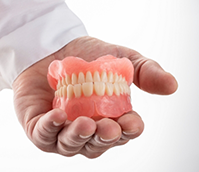
Remove After Eating
After eating, you need to remove and rinse off your dentures. Doing this will help keep food debris and plaque from building up on your prosthetics. Make sure you avoid using hot water for the rinse! Extreme temperatures can warp denture material and cause them to fit poorly with time.
Clean Your Restoration
You need to remove your dentures at least once a day to clean them. Otherwise, you could increase your risk of gum disease and similar conditions. For thorough cleaning, you simply need to use a soft-bristled toothbrush and a small amount of hand soap. Don’t use regular toothpaste as the abrasiveness can harm your dentures.
If you have time, place the dentures in water or a cleansing solution after brushing them. Rinse them carefully before putting them back into your mouth.
Keep Your Dentures Safe
The safety of your dentures should always be a priority. Since they’re quite fragile, you want to make sure you protect them as much as possible to reduce the probability of them becoming damaged.
For instance, you should keep a towel handy for denture cleaning. Place one underneath the prosthetic to cushion them in case they fall. You should also store them away from small kids or pets.
Remove When You Sleep
Take your dentures out before bedtime and store them in a glass of soaking solution. Sleeping with them in your mouth can lead to complications and unwanted issues. Using your dentures restricts your gum’s circulation, which can lead to soft-tissue irritation. Not only that but using dentures overnight is unsanitary. It’s associated with a high pneumonia risk and raised gum and tongue plaque levels.
Notice Changes
As you get used to your dentures, keep an eye out for changes in them or your mouth. It’s best to address these shifts with your local dentist. You should see a professional quickly if your dentures start to fit poorly or get damaged. Do not fix them yourself, as that could lead to further harm.
All-on-4 Dentures
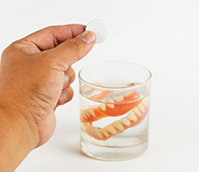
Unlike removable dentures, All-on-4 are permanent and irremovable. As such, they require their own care techniques, like:
- Brushing twice a day. Make sure you use a soft-bristled manual or electric toothbrush to brush your dentures. Also, it’s a good idea to stick to non-abrasive toothpaste.
- Flossing daily. You should floss your replacement teeth once a day to keep your dentures clean. If needed, you can use a floss threader to get beneath the denture.
- Close attention to the gumline. Consider using a sulcus brush when cleaning between the restoration and gums. This is usually 1/3 of the width of regular toothbrushes, making it a great option.
- Daily mouth rinses. Rinse your mouth with antibacterial mouthwash every day to prevent the growth of tartar.
Dentures FAQ’s
Do I Brush Dentures Like Regular Teeth?
Yes and no. Cleaning dentures is similar in that they should be brushed after each meal to remove food particles, plaque, and debris. However, there are a few additional steps you need to take to keep them in pristine condition. First, you should use a denture-friendly toothpaste and toothbrush since traditional ones are too abrasive. Next, soak your dentures at night to keep them clean and prevent their shape from warping. Lastly, take special care to remove leftover adhesive, which can cling to the dentures even after they’ve been removed.
Will Dentures Change How I Speak?
Whether you have full, partial, or implant dentures, it may take some time for your tongue to adjust and begin properly enunciating words again. Fortunately, you can expedite the process by reading a book or magazine out loud. Many patients find it is also helpful to repeat troublesome words over and over to adjust to the learning curve. If difficulty speaking is a result of movement, contact our office so we can have them adjusted.
Do I Still Need Dental Checkups If I Don’t Have Any Natural Teeth?
Yes! Even if you are missing an entire arch of teeth, your mouth continues to change, which is why routine visits are so important. At your six-month appointment, our team will conduct an exam to ensure your oral health is in good condition, take X-rays (if needed), and adjust your dentures for minimal movement. Plus, it’s a perfect opportunity for our team to answer any questions or concerns you have about caring for them properly.
Will My Dentures Need Adjusting?
Although dentures are a modern, life-like solution to tooth loss, they are currently unable to prevent your jawbone from deteriorating. Therefore, your dentures may become loose over time, resulting in movement while you eat, chew, or laugh. Attempting to fix them on your own can lead to significant damage and potentially harm your teeth and gums, which is why you should always call our office first. At your appointment, we can adjust them accordingly so you can enjoy your life without worrying about your dentures!
Do Dentures Break Easily?
Since dentures are crafted from high-quality materials, they are by no means fragile. That said, they also aren’t indestructible. That’s why we encourage our patients to adopt habits like storing their dentures properly when they aren’t wearing them and cleaning them over a sink filled with water or a soft towel. This combined with a solid oral hygiene routine and a diet that’s free of extremely crunchy, hard, and sticky foods will help them last for upwards of a decade.
Should I Have All My Teeth Pulled to Get Dentures?
If your remaining teeth are healthy, we won’t recommend having them pulled. If, on the other hand, there is a severe crack in the enamel or one or more teeth are about to fall out due to advanced gum disease, then we will have them removed beforehand. Ultimately, whether or not you should have your teeth pulled depends on your unique dental needs, so we will need to conduct a thorough oral exam to share our recommendations on the best way to move forward.
Can I Sleep with My Dentures?
Typically, patients are asked to wear their dentures 24/7 when they first get them. There will come a time, however, when you will need to take them out every evening while you sleep. This allows blood to re-circulate to your gums, prevents soft tissue irritation, and reduces the chances of your dentures becoming a breeding ground for bacteria. So, make sure you get in the habit of soaking them in water or denture cleaner at night once you get the green light to do so.
Am I Too Young to Get Dentures?
There is a common misconception that dentures are only for seniors. That’s not the case. In fact, this tooth-replacement solution is suitable for patients in their 20s, 30s, 40s, and 50s as well! So, no matter how old you are, if you’re struggling with tooth loss, don’t hesitate to schedule an appointment at our Torrance dental office to discuss your treatment options.
What Can’t You Eat with Dentures?
There are some foods we recommend avoiding with dentures. The first is taffy, sour gummy worms, and other sticky candies. After all, they are packed with sugar and can easily tug your restoration out of place. We also recommend avoiding popcorn, corn on the cob, raw nuts, and other crunchy foods that require more chewing power. Ultimately, it’s best to stick to softer, more nutrient-dense foods as much as possible, including vegetable soup, oatmeal, and seedless smoothies.
Why Do My Dentures Smell?
If your dentures smell, it’s time to take a look at your diet and your oral hygiene regimen. In addition to eliminating extremely pungent foods from your diet, like garlic, make sure that you’re brushing after each meal and taking great care of your dentures. If you’ve tried everything but nothing seems to be working, then schedule an appointment with us. From there, we can learn more about what’s going on, take a look at your teeth, your gums, and your dentures, and determine what the root of the problem is.
